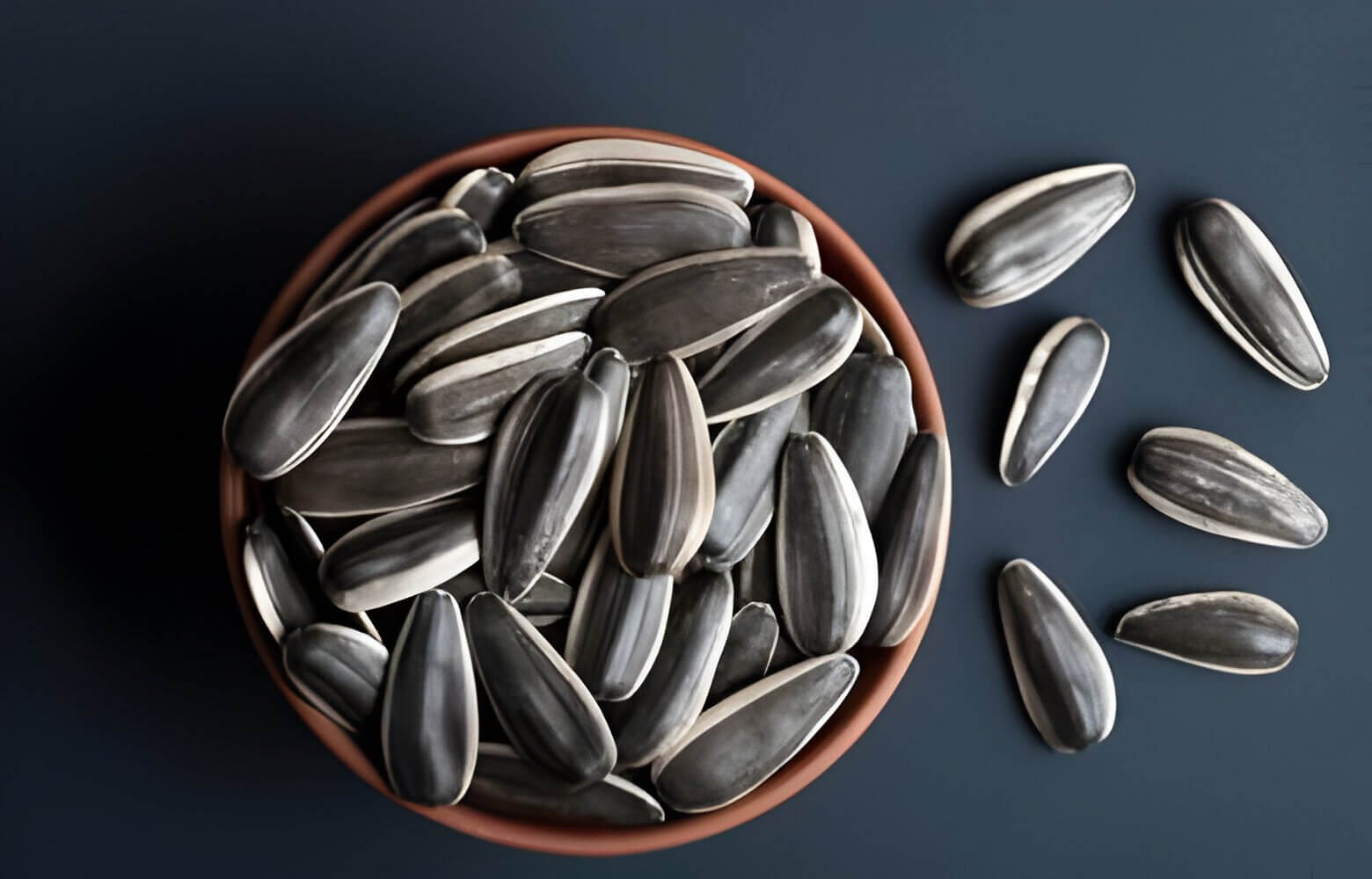No, dogs should not eat sunflower seeds with shells. While sunflower seeds themselves can be a healthy snack for dogs when given in moderation, the shells pose potential health risks and offer no nutritional benefits when ingested. The reasons why dogs can’t have seeds with shells are listed below.
- Digestive Issues: The hard, fibrous nature of sunflower seed shells can lead to digestive blockages or irritation.
- Choking Hazard: They can be a choking risk, especially for smaller breeds or puppies.
- No Nutritional Value: The shells do not provide any significant nutritional benefits to dogs.
What are Sunflower Seed Shells?
Sunflower seed shells are the hard, inedible outer husks that encase the edible seeds of sunflowers. Unlike the nutrient-rich seeds they protect, these shells are primarily composed of cellulose and lack the nutritional value their inner kernels possess.
Sunflower seed shells, often discarded after the seed is consumed, are characterized by their rigid texture and fibrous composition. This toughness makes them challenging to digest for humans and animals alike. While some may consider these shells mere byproducts of sunflower seed consumption, their role in nature extends to protecting the seed from external threats until it’s ready to germinate.
Do Sunflower Seed Shells Provide Any Nutritional Benefits for Dogs?
When considering sunflower seeds as a potential snack for dogs, one may wonder if there are any benefits to feeding them the seeds with the shells on. The simple answer is no; sunflower seed shells do not offer any nutritional benefits to dogs. The nutritional value lies within the seed itself, containing healthy fats, protein, fiber, vitamins, and minerals beneficial to a dog’s diet. In contrast, the shells are indigestible and provide no nutritive value. Their hard, fibrous nature can even pose health risks, making them unsuitable for canine consumption.
Are Sunflower Seed Shells Bad for Dogs?
Yes, sunflower seed shells can be bad for dogs. While the seeds themselves are non-toxic and can be safely consumed by dogs in their shelled form, the husks should be avoided. The shells contain indigestible fiber which can cause discomfort and potential harm to a dog’s digestive tract.
Digestive System Concerns
- Indigestibility: The fibrous shell is not broken down efficiently by a dog’s digestive system, which can lead to gastrointestinal upset.
- Obstruction Risk: Ingesting these tough shells can cause obstructions in the intestines, which might require surgical intervention.
- Mouth and Throat Irritation: The sharp edges of the shells can scratch the mouth and throat, causing irritation or injury.
What are the Risks of Dogs Ingesting Sunflower Seed Shells?
The risks associated with dogs ingesting sunflower seed shells range from mild to potentially severe. Here’s what concerned dog owners should be aware of:
Potential Health Risks
- Choking Hazard: Sunflower seed shells can easily become lodged in a dog’s throat, posing an immediate choking danger.
- Gastrointestinal Blockage: If swallowed, the shells can accumulate and form a blockage in the gastrointestinal tract, which might be life-threatening without prompt veterinary care.
- Intestinal Perforation: The sharp edges of husks can puncture the lining of the stomach or intestines, leading to a serious condition called peritonitis.
- Inflammation or Infection: Small cuts or abrasions caused by the shells in the mouth, throat, or intestines can get infected and lead to further health complications.
Symptoms to Watch For
Dog owners who suspect their pet has ingested sunflower seed shells should look for symptoms such as:
- Coughing or gagging
- Drooling excessively
- Abdominal pain
- Vomiting or retching
- Loss of appetite
- Lethargy
- Constipation or difficulty with bowel movements
What Is the Recommended Serving Size of Sunflower Seeds with Shells for Dogs?
Given the potential health risks associated with the ingestion of sunflower seed shells, there is no recommended serving size for sunflower seeds with shells for any dog breed or size. The emphasis should always be on safety first, meaning that the shells should be removed before offering sunflower seeds to your dog.
If you’re considering adding sunflower seeds to your dog’s diet for the nutritional benefits they offer, it’s important to do so cautiously and in moderation. A few unsalted, shelled sunflower seeds can be a healthy treat for most dogs. However, the exact amount should depend on the dog’s size, diet, and overall health. For a small dog, a couple of seeds might be sufficient, while a larger dog may be able to have a few more.
What to Do If Your Dog Eats Sunflower Seed Shells
If you notice that your dog has eaten sunflower seed shells, it’s important to take immediate and appropriate actions to ensure their health isn’t compromised. Here are the steps you should consider:
- Observe Your Dog: Watch closely for any signs of choking, distress, or difficulty breathing. Pay attention to their behavior for the next few hours to see if they show any symptoms of gastrointestinal discomfort such as excessive drooling, whining, a hunched back, vomiting, diarrhea, or constipation.
- Evaluate the Amount Consumed: Consider how many sunflower seed shells your dog may have ingested. A small amount may pass through the system with mild or no symptoms, while a larger quantity could be more concerning.
- Do Not Induce Vomiting: Avoid trying to make your dog vomit unless instructed to do so by a veterinarian. Inducing vomiting improperly can cause additional health problems.
- Contact Your Veterinarian: If your dog shows any symptoms or if they have ingested a large number of shells, call your veterinarian immediately. Describe what your dog has eaten, how much they have consumed, and any symptoms they are displaying.
- Prevent Future Incidents: After addressing the immediate issue, take measures to prevent similar situations in the future. Keep sunflower seeds and other potentially harmful foods out of your dog’s reach, and educate family members about the risks associated with feeding dogs improper foods.
